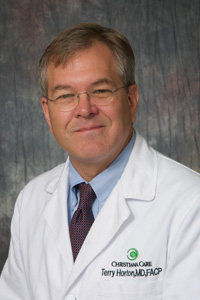Terry Horton testifies before U.S. Senate on opioid epidemic
Christiana Care addiction medicine expert shares insights on synthetic opiates.

The chief of Addiction Medicine at Christiana Care Health System testified May 25 before the U.S. Senate Committee on Homeland Security and Governmental Affairs on Capitol Hill about the scourge of opioid addiction.
Speaking at a hearing on the nation’s synthetic opioid epidemic, Terry Horton, M.D., FACP, FASAM — one of the foremost experts on addiction medicine — warned members of Congress that the opioid epidemic “is critical, urgent and getting worse.” Dr. Horton also noted that when clinicians “provide the right treatment, we can reduce drug overdose deaths.”
“When we can lengthen a patient’s time in treatment, we know we will get better outcomes,” Dr. Horton said. “When we combine medication-assisted treatment and therapy, we can win this battle that is being fought by nearly every family in our country.”
Most prescription pain relief medications exist as synthesized versions of natural opiate drugs such as opium, morphine and heroin. These drugs are powerful painkillers and have become some of the most commonly abused in the nation, with an estimated 2.1 million Americans suffering from substance-use disorders related to prescription opioid pain relievers, according to the U.S. National Institute on Drug Abuse.
Titled “Stopping the Shipment of Synthetic Opioids: Oversight of U.S. Strategy to Combat Illicit Drugs,” the hearing was organized by the Committee’s chief investigative subcommittee, which studies the efficiency and economy of operations related to all branches of the government.
The hearing came as the U.S. Senate prepared to vote on the overhaul of the federal health law that opened the door to health insurance for millions of Americans and underpinned the opportunity for people with addictions to access evidence-based treatments. The American Health Care Act — the bill to repeal the existing law – would reduce the number of Americans with health insurance by 23 million, according to the Congressional Budget Office. The bill caps federal funding to states for their Medicaid program and scales back tax credits that help some people pay for private health insurance.
“The opioid epidemic has touched nearly every family in our community in some way, and it is getting worse,” said Bettina Tweardy Riveros, Christiana Care’s chief health equity officer and senior vice president of government affairs and community engagement. “The proposed cuts to Medicaid would devastate the long-term effective treatments that are saving lives by preventing more overdose deaths every day.”
Dr. Horton shared overwhelming data that supports the fact that long-term treatment — including the use of medication-assisted therapies – can help people break the cycle of opioid addiction.
“We know how to treat this epidemic,” Dr. Horton said. “We are learning what works … That means we have hope, but only if our policy decisions continue to support evidence-based treatment.”
Throughout his career, Dr. Horton has developed initiatives to treat addiction that have been adopted nationally. Most notable is the early-intervention substance abuse program at Christiana Care known as Project Engage. Through this program, health care professionals known as engagement specialists, who are peers in recovery, reach patients with substance abuse problems at their hospital bedside. By reaching those patients while they are at the low point of their addiction, the engagement specialists have a greater chance of successfully linking those patients to resources in the community that put them on the path to recovery. Project Engage also has been highlighted by the American Society of Addiction Medicine as a national model.
At Christiana Care, Dr. Horton and his colleagues also developed and launched the opioid withdrawal clinical pathway, an innovative effort to screen, identify and treat opioid-addicted patients who are admitted into the hospital that improves the quality and safety of their care, improves their patient experience and reduces their cost of care.
“Today’s opioid crisis is arguably the worst in American history, and Delaware has not been immune to this heartbreaking epidemic,” said U.S. Senator Tom Carper (D-Del.), the ranking member of the U.S. Senate Committee on Homeland Security and Governmental Affairs’ Permanent Subcommittee on Investigations. “Dr. Terry Horton spoke to the seriousness of this epidemic in Delaware, where over the past three years, hundreds of families have suffered the loss of their loved ones to fatal overdoses, and many more have witnessed someone they love struggle with addiction or substance abuse. We know that opioid addiction is a complex problem, but we also know that fatal overdoses are preventable. It’s absolutely imperative that Congress provides not just law enforcement, but also our health care providers with the tools and funding resources they need to save lives and help people recover from this deadly disease.”